Lady Thunderbirds’ Head Coach Dwight Gunnare announces retirement
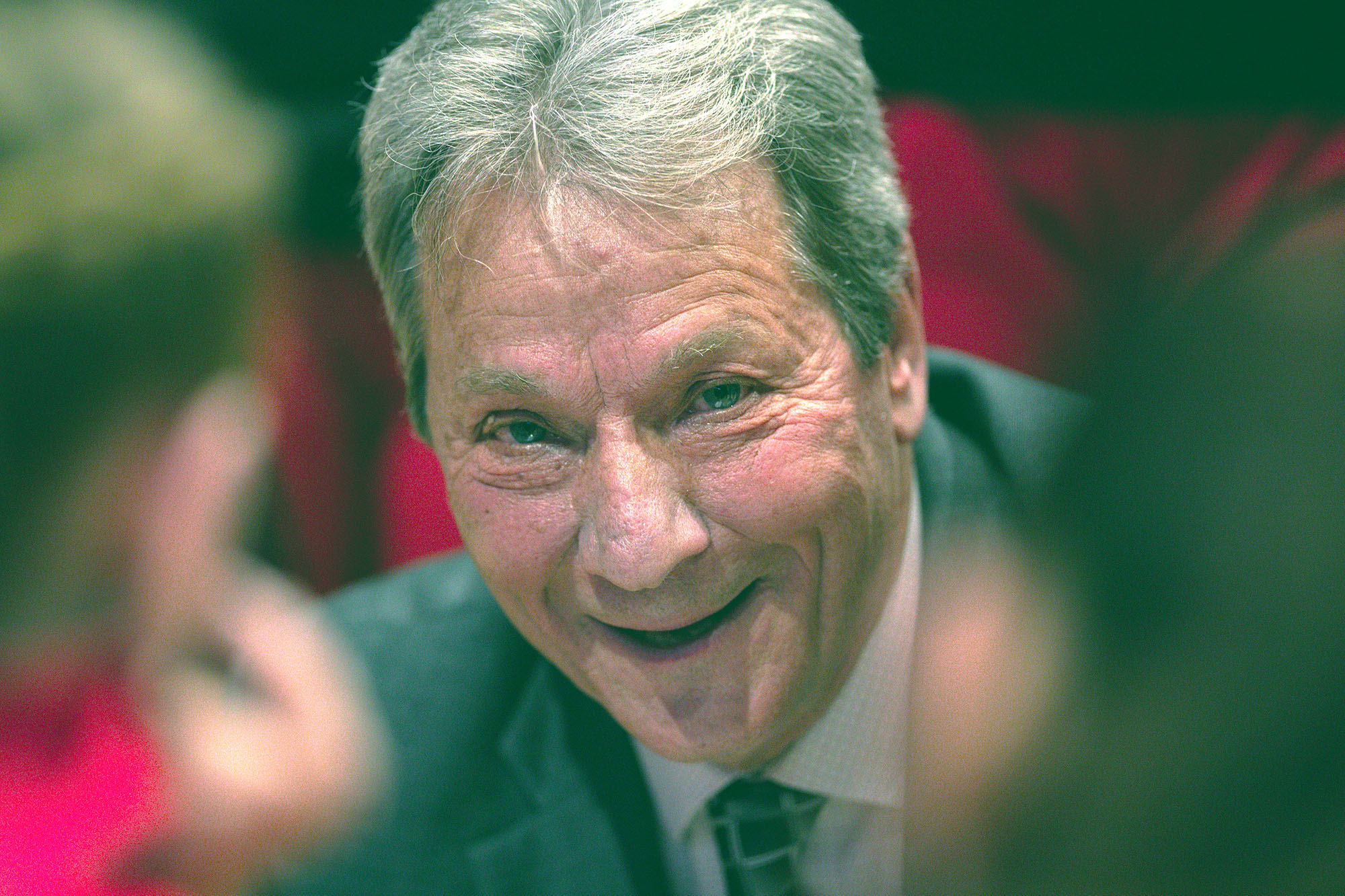
Casper College Lady Thunderbirds Head Coach Dwight Gunnare. (Casper College photo/Zach Nagy)
Women’s basketball head coach Dwight Gunnare has announced his retirement effective June 30, 2025.
Gunnare joined the Casper College program as head coach in 2008. He replaced outgoing head coach Angelo Hill, who resigned to move to New Zealand. Gunnare has been the head coach of the Casper College Lady Thunderbirds longer than anyone else. At the end of the 2023-2024 season, Gunnare’s Lady T-Birds had won 425 wins and lost only 98, providing him with a .812 winning percentage rate as a coach. “I certainly couldn’t have accomplished that win rate without the dedicated players who have played on this team over the years and the support from the administration and my assistant coach for the last eight seasons, Nate Macy,” said Gunnare.
During Gunnare’s time as head coach, the team averaged 26.6 wins per season. The team has played in the NJCAA National Tournament eight times, placing fourth in 2010 and ninth in 2011. Team records include the most total rebounds, 1520 during the 2018-19 season; the longest 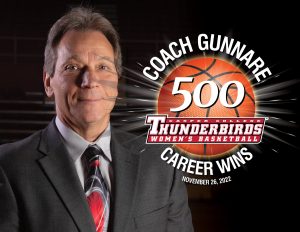 winning streak, 37 games from 2019-2021; and the first undefeated regular season in school history, 20-0 during the 2020-21 season. On November 26, 2022, he hit a historic milestone when he reached his 500th win as a college coach.
winning streak, 37 games from 2019-2021; and the first undefeated regular season in school history, 20-0 during the 2020-21 season. On November 26, 2022, he hit a historic milestone when he reached his 500th win as a college coach.
Gunnare wants his players to do well on the court and in the classroom. At Casper College, he has had 10 teams receive NJCAA All-Academic recognition and 54 individuals recognized as NJCAA All-Academics.
Before his time at Casper College, the Wagner, South Dakota, native spent 26 years coaching in eastern Montana following his graduation from Black Hills State University in 1982, where he was inducted into that school’s Coaching Hall of Fame in 2015.
Gunnare began his acclaimed career in the tiny Montana town of Ashland, where he mentored junior high basketball players. A baseball player in college, his original plan was to teach physical education and coach high school baseball. But he and his wife, Ann, were expecting their first child. “Those opportunities weren’t available right away, so you had to take the first available job, and that was at a tiny K-8 school in Ashland,” he recalled.
At Ashland, Gunnare was the coach for all the sports the school had at the time: girls’ basketball, boys’ basketball, and track. He was paid $600 a season. “We had some success, and I could tell the kids enjoyed the process, which shifted my mindset on what I wanted to coach. Even though it was a K-8 school, the experience really shaped my love and my passion for coaching girls’ basketball,” Gunnare said. His decision to focus on coaching girls’ basketball was an “opportunity” because, according to Gunnare, the girls’ junior high team became very successful the last two years that he coached. “I think we went 20-2 the last season, and that caught the eye of a nearby, bigger school district at Colstrip, Montana.”
Six years later, Gunnare found himself in Colstrip High School as the head coach of the Colstrip Fillies. For 11 seasons, he led the Fillies to an overall record of 175-87. During that time, the Fillies went to the state tournament for eight straight years and won the Class A Girls Basketball Championship in 1993 and 1999.
In 2002, Gunnare left Colstrip for the opportunity to take over the head coaching reins at Miles Community College. “The success that we had in Colstrip at the high school level got me my opportunity at Miles Community College, which got me my opportunity here in Casper,” Gunnare noted. During his six seasons at the college, the Pioneers won 125 games. The team had a 31-2 record during his final season at the school. He was named the NJCAA Region 9 Coach of the Year that same year. He was also named the Mon-Dak Conference Coach of the Year in 2006-07 and 2007-08. 2008 was quite a year for Gunnare.
Gunnare acknowledges there was a bit of a transition going from high school ball to college ball, with the addition of a shot clock and the skill level of the players. The shot clock helps to speed up the game’s play and, along with the greater skill level of the players, meant that “I had to change a little bit on how I did things, especially offensively,” he said. At Colstrip, “We had so much success with our full-court press. But at the college level, there are very good ball handlers, which meant I couldn’t utilize the full-court press as often. So, there are subtle changes.”
His coaching prowess and ability to recruit outstanding players only grew with his move to Casper. In his first season, he was named the Wyoming Conference Coach of the Year and has been named Region 9 Coach of the Year 12 times, including each of the past seven years. At the end of the 2023-2024 season, the Lady T-Birds were No. 16 in the nation with a 28-5 record. The team also became four-time North Sub-Region Championship winners and won the Region 9 Women’s Basketball Tournament for the third straight year.
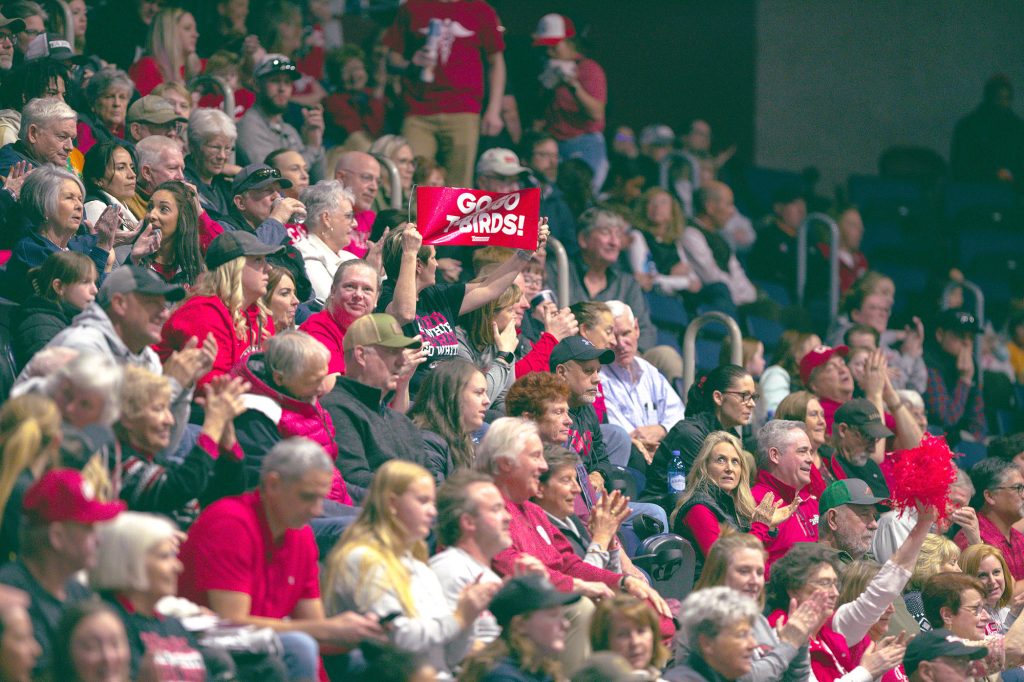
Fans came out to support the Casper College Lady Thunderbirds during the NJCAA DI Women’s Basketball Championship in March 2024. (Casper College photo/Zach Nagy)
“LEGEND! Once in a great while, you find a coach who not only wins but consistently wins. When you add to that that their student-athletes not only win on the court but in the classroom and in life, you have something absolutely amazing,” noted Paul Marble, athletic director. “I love Dwight Gunnare. We all do. He has been amazing for Casper College. What a great career Coach Gunnare has had. He has always done things the right way,” Marble added.
“Dwight has contributed so much to Casper College and to so many student-athletes. His career at CC has been exceptional and he will be sorely missed. I wish him nothing but the best in his retirement,” said Linda Toohey, vice president for student services.
Gunnare has noticed that both students and players have changed over the years. He noted that his coaching style had to change significantly as the students’ learning style changed. “Early in my career, instruction was all I needed. If I told them, ‘This is what we’re going to do,’ or ‘this is how we’re going to do it,’ that was it,” Gunnare reflected. But now students also need to understand “… the why to why you do things, or how you do things. Being a mental coach and a psychologist and understanding how the kids will react to what you’re doing is critical. I think I spend more time on that than I do on the actual X’s and O’s of basketball,” he said.
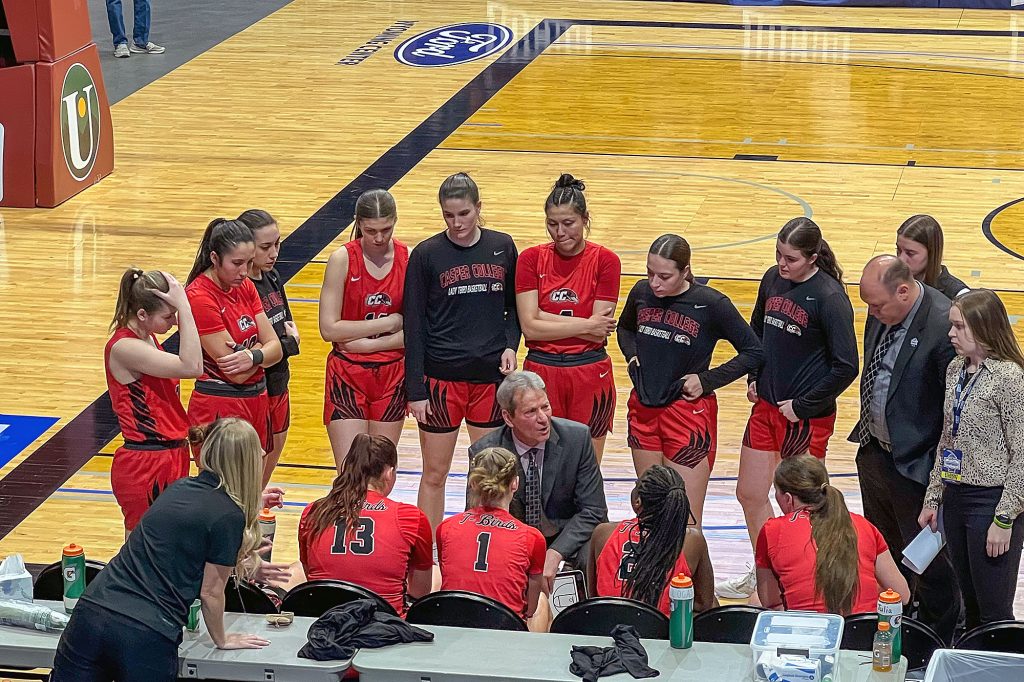
Casper College Women’s Head Basketball Coach explains the team’s upcoming game plan during the NJCAA National Women’s Basketball Championship in March 2024. (Casper College photo/Zach Nagy)
Gunnare believes that the change in coaching styles over the years is a good development and attributes it to social change in general. “When I was playing and early got into coaching, it was very abrasive. A lot of coaches were very abrasive, demeaning, and personal, and that wasn’t right,” Gunnare noted. Over his 40 years in coaching, he believes these changes have been positive in both the coaching and athletic realms. The only thing he does not believe helps the player is when coaches enable their players and inadvertently create reasons for the individual not to reach their potential or accomplish the goals that they are capable of. “I don’t think that sets up anybody well for life,” said Gunnare.
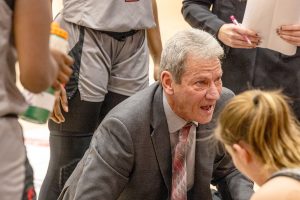
Casper College Lady Thunderbirds’ Head Coach, Dwight Gunnare, discusses strategy with players during a time out. (Casper College photo/Zach Nagy)
Gunnare feels that the change in the psychology of the students and how they approach things, in general, is different from how they used to. He uses the example of name, image, and likeness: “Just looking at the college level and money for college athletes, It’s not about, ‘is my team successful?’ Instead, it is ‘Am I getting the opportunity and putting up the stats to provide a financial gain for me in another year?’ So the college level is really pushing from group thinking, group success, to individual success,” he said. “I’m all about the group. We’re all one piece of the pie. No piece of the pie is bigger than the other. It’s the group, and the trends are shifting away from that. I would struggle with that,” he noted.
Philosophically, Gunnare believes that when a person chooses to do something, they should do it to the best of their ability. “That includes myself, my assistant, and my players, and the outcome is going to be the outcome. But as long as it is your best, and it’s probably cliche, but as long as it is your best, you just never fail,” he said.
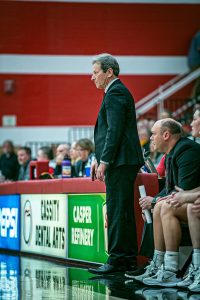
Head Coach Dwight Gunnare, standing, and Assistant Head Coach Nate Macy watch a game from the sidelines at the “Swede” Erickson Thunderbird Gymnasium. (Casper College photo/Zach Nagy)
Like other highly successful NJCAA coaches, Gunnare has been offered jobs a number of times from NCAA colleges. But, unlike many others, Gunnare has always turned those offers down. One thing he attributes turning down those offers to is starting in the collegiate ranks at 42. It was intriguing to Gunnare, but “I loved the format of two-year college, of junior college, because about half our team turns over.” Gunnare has always loved the teaching aspect of coaching, noting that at a two-year school, half the team receives instruction new to them. “If I had them in the third and fourth years, the newness would wear off, and when the newness wears off, I think there’s a drop in buy-in and motivation,” he said. Gunnare enjoyed the flexible schedule available during the summer, allowing him to travel and spend time with his wife. “I do, and I always will wonder, could I have been successful at the division one level as a coach,” he admitted, but noted that he had no regrets not pursuing it “… because I know the reasons why I didn’t choose to pursue it are valid.”
Over the 17 years at Casper, several events stand out in Gunnare’s mind. The first would be when the team made it to the Final Four in the NJCAA National Tournament in 2010, and a contingent of employees from Casper College rode a bus for 12-plus hours to Salina, Kansas, to cheer the team on. “It felt great representing a place that was willing to organize a bus ride to come to support the coaches and team, which was extremely meaningful,” said Gunnare.
The second memorable event came at last year’s NJCAA National Tournament, held for the first time in Casper. The Lady Thunderbirds qualified to compete in the tournament thanks to another win as the Region 9 champions and ended the season ranked No. 14 in the country. “I just didn’t realize how great of an experience that could be.” After winning the first round against No. 19 Blinn College Buccaneers 72-61, the next night, the team played against No. 3 Northwest Florida State Raiders. The Birds lost 76-69, but the experience was like none other. Both nights, Gunnare noted that he felt the crowd’s energy and that of the team. “At that last game, 4,000 fans filled the stands. Both nights were an experience a lot of the team had never had in their lifetime. Just to have our team be able to experience that much support was amazing,” said Gunnare.
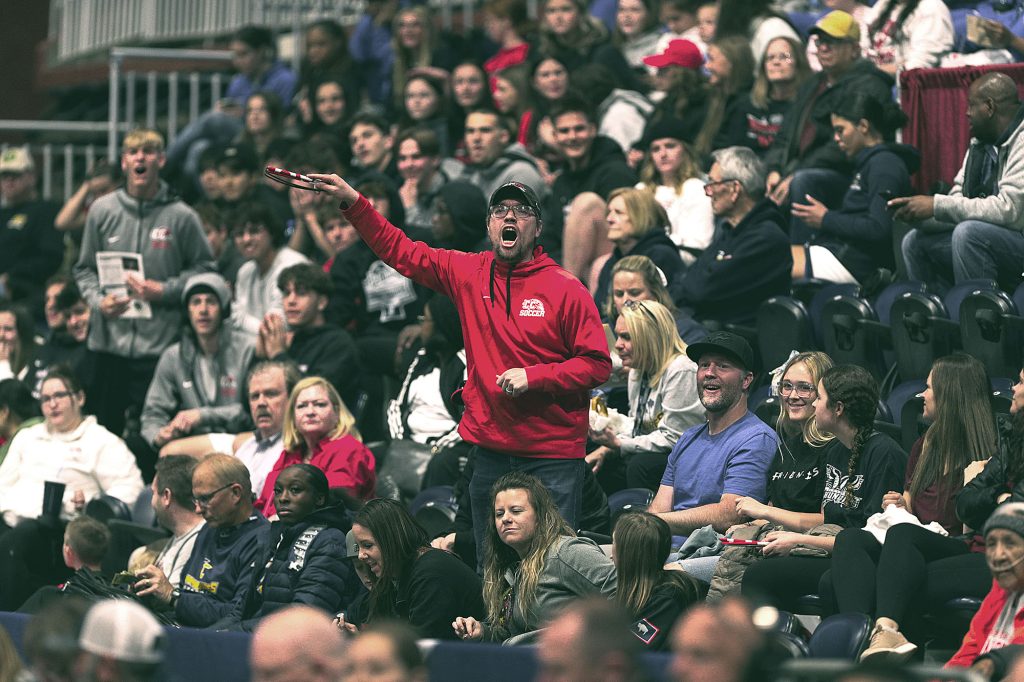
Casper College Men’s Soccer Head Coach Ben McArthur was an enthusiastic supporter of the Lady T-Birds during the NJCAA National Women’s Basketball Championship in March 2024. (Casper College photo/Zach Nagy)
Gunnare’s transition from Miles City to Casper surprised him. He had felt that going from a town of under 9,000 residents to one of 58,000, he would lose the rural community values and family-orientated atmosphere. “I really felt, ‘Oh, man, I’m going to the town of 58,000. I’m going to lose that.’ Nope. I didn’t. The people in Casper and the people I work with at the college are equally as great. The rural community values were as strong here as in Miles City.”
Gunnare admits that he and Ann, who will retire from the Natrona County School District at the end of this school year, don’t have a well-planned retirement schedule. “Until we realize what retirement looks like, there’s no reason to move. We will escape winter for several weeks at a time, but until we know what it looks like, we don’t want to make any rash decisions. So, at this point, we plan on staying in Casper, and if the trajectory of our lives shifts and requires us to relocate, then that’s what we do.”
Gunnare is clearly grateful for the time he has had as a coach at all four schools. “I feel extremely fortunate for all the experiences that I’ve been able to have in my career, and I’ve had great experiences at every one of my stops. I don’t think many people can say that they have zero regrets in their career, but I can. I have tremendous memories and feel very fortunate to be able to do this as long as I have. I have loved it, and it’s never seemed like a job.”
Gunnare knows he will have a hard time when that last game buzzer sounds. He loves the game, the players, the school, and the community, and that last buzzer signals the end of an era at Casper College and the closing of another chapter in his life. “I’ll get emotional when that happens, but I know the time is right for me to leave,” Gunnare noted. Gunnare made it clear, however, that he has not lost his love for coaching and being around kids. “It is going to be a very, very empty feeling when it’s all over, but I know it’s the right decision,” he concluded.
When Gunnare applied for the job at Casper 17 years ago, he still clearly remembers the interview process that went from 7:30 a.m. to 6 p.m., with part of that time spent in the lobby of the Erickson Thunderbird Gymnasium. “When I walked out of the gym that night, my wife was waiting in the car, and I said, ‘I want to be here. This place. This place is well organized. There are a lot of people that buy into the program and want to support the program. I really, really want this job.’”
